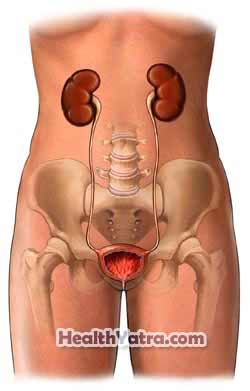تعريف
A radical cystectomy is a surgery to remove the bladder.
أسباب هذا الإجراء
Reasons for a cystectomy include:
- Cancer of the bladder
- Problems with nerve-muscle control of the bladder
- Bladder damage from radiation or chemotherapy
- Bladder damage or bleeding from other conditions, treatments, or injuries

المضاعفات المحتملة
Complications occur in 25%-35% of patients who have cystectomy. If you are planning to have a cystectomy, your doctor will review a list of possible complications. These may include:
- العدوى
- نزيف
- Loss of sexual function
- Fluid build-up in the abdominal cavity
- الأضرار التي لحقت الأجهزة الأخرى
- Blockage of urine flow from the ureters to the bladder
- Nutrition problems (depending on the bowel segments used to create a way for urine to drain)
- Blood clots
- رد فعل للتخدير
- سلس البول
Previous surgery in the abdomen or pelvis or radiation to the area increases your risk of complications.
ما يمكن توقعه
قبل الإجراء
Doctors recommend that you quit smoking before surgery. You may also need to take antibiotics to prevent infection and laxatives to clean out the bowels.
The night before, you may be asked not to eat anything and to only drink clear liquids. Do not eat or drink anything after midnight or on the morning of the procedure. This includes avoiding clear liquids, coffee, tea, and water.
Talk to your doctor about your medicines. You may be asked to stop taking some medicines up to one week before the procedure, such as:
- الأسبرين أو غيره من العقاقير المضادة للالتهابات
- مميعات الدم ، مثل كلوبيدوجريل أو وارفارين
التخدير
General anesthesia is given before surgery. You will be asleep.
الوصف الداخلي
An incision will be made in the abdomen to expose the bladder. All blood vessels to the bladder will be cut. The bladder will then be removed. Other tissues and organs may also need to be removed with the bladder.
The doctor will also need to create a new way for urine to be passed out of the body. A new bladder may be built using pieces of intestine. Or, an external bag may be attached to the abdomen.
كم من الوقت سيستغرق ؟
About 3–6 hours
كم هو مؤلم ؟
Anesthesia will prevent pain during the surgery. Recovery is usually painful. Your doctor will give you medicine to help manage the pain.
متوسط الإقامة في المستشفى
The usual length of stay is 5-12 days. The specific length of time will depend on your condition and the reason for surgery. Your doctor may also choose to keep you longer if complications occur.
رعاية ما بعد العملية
في المستشفى
- A stay in the intensive care unit for 2-3 days may be needed.
- During surgery, a tube will be placed from the nose to the stomach. It will stay there for several days. Because you cannot eat with the tube in place, you will receive IV fluids.
- If a urine bag was attached during the surgery, you will be taught how to dispose of urine.
في البيت
عند عودتك إلى المنزل، قم بما يلي للمساعدة في ضمان التعافي بسلاسة:
- Difficult physical activity should be avoided for 4-6 weeks.
- Avoid heavy lifting, straining, and sexual activity until your doctor tells you it is okay.
- Driving and climbing stairs is usually allowed. Ask your doctor about any restrictions.
- اسأل طبيبك حول, عندما هي آمنة للاستحمام, السباحة, أو نقع في الماء.
- تأكد من اتباع تعليمات طبيبك.
استدعاء الطبيب
بعد مغادرة المستشفى، اتصل بطبيبك في حالة حدوث أي مما يلي:
- علامات الإصابة, بما في ذلك حمى وقشعريرة
- Redness, swelling, increasing pain, heavy bleeding, or discharge from the incision and/or stoma site
- الغثيان و/أو القيء
- ألم لا يمكنك السيطرة عليه بالأدوية التي أعطيت لك
- Inability to urinate or difficulty urinating, extreme cloudiness or pus in the urine, a bad odor to the urine
- السعال، ضيق التنفس، أو ألم في الصدر
في حالة الطوارئ ، اتصل على المساعدة الطبية على الفور.
